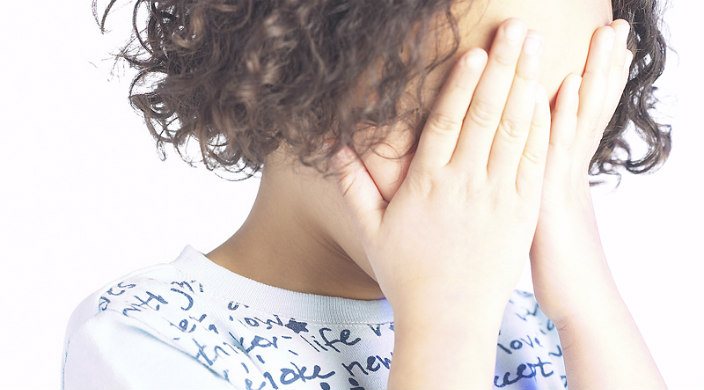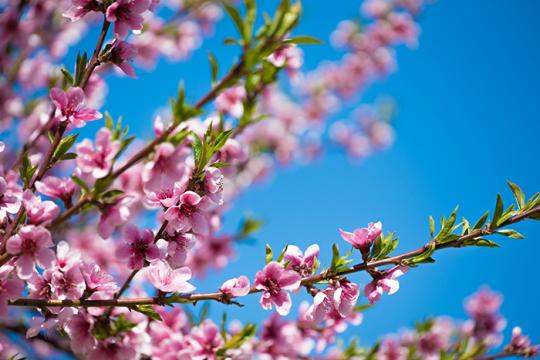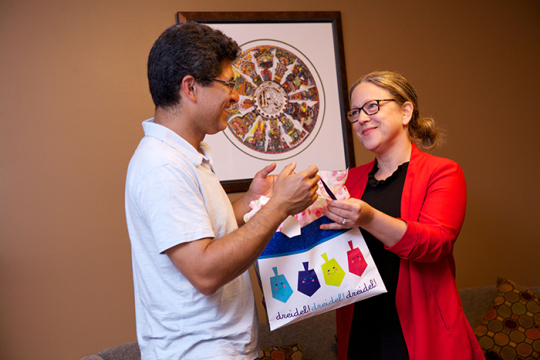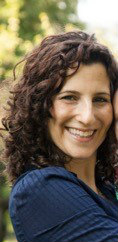
In the wee hours of the night, my 6-year-old son creeps to my bedside and begins to cry. When I reach out to hug him, he says, “I had a nightmare.” I take him in my arms, hold him close, and plant a kiss on his wet brow, then I scoop him up and bring him back to his room. As I brush the hair away from his eyes, I think about the worries and anxieties that occasionally haunt him at night. For now, I can ease his fears with a cuddle or a kiss or a song. For now, I can quiet the worry in his head.
My son isn’t old enough to read the news or catch the headlines on television. He doesn’t know much about what happens beyond the confines of our apartment or the four walls of his school. Sure, he thinks he knows about “bad guys;” after all, he loves superheroes and Power Rangers. And I believe he has some inkling about suffering and heartache, having grown up in New York City, where he is exposed to a wide swath of urban life. For the most part, though, he has been sheltered from the hard truths of the world and shielded from the violence and unimaginable scenes of bloodshed that have become so confoundingly commonplace.
For better or for worse, my son doesn’t yet know how scary this world can be – and I’m not eager to break it to him.
I’m not looking forward to the moment he comes to me asking me about the news of the day. I know it will frighten him. I know his innocence will be shattered forever.
I’m not ready to let fear leach into his joy. I’m not ready to complicate his view of humanity. I’m not ready to counter his unabashed, unbridled sense of love with an equally unbridled hate. It doesn’t seem fair. I wouldn’t wish such existential concerns on any child, let alone my own.
And yet, this is the world in which we live – problematic, messy, endlessly challenging, and often, quite unnerving. No matter how much I want my child to exist in a more perfect world, that world has yet to come. My son will at some point collide with this reality. He will stumble upon the news or overhear someone talking, or read the newspaper himself. And then what?
My mind keeps returning to the prayer for creation, a prayer we sing every time I join my son for t’filah (worship) in his classroom. We say: “Blessed are you, Adonai our God, ruler of the Universe, Creator of Light and Maker of Darkness.” Every morning we affirm that where there is light, there is also darkness, and where there is darkness, there is also light. Light and dark are two sides of the same coin; they are two parts of a single whole. Ours is a world where darkness and light comingle.
As we read in the creation story, “There was evening and there was morning.” Thus we live, inexorably, in a world with both darkness and light, good and bad, joy and pain, life and death. Life is built on these dualities.
Of course, as my son and I clap and sing and dance our way through this prayer, I know in my heart of hearts that he doesn’t fully comprehend the depth of these words. At such a tender young age, how could he? And yet, at some point he will begin to notice the shadows in the sun. He’ll see the way the light is sometimes obscured by darkness, and he’ll likely discover places where light has yet to even break. He will see that this world is far from ideal, and he will learn that this world is broken and in dire need of repair. He will realize that we are fragile and life is unpredictable. At some point, all of this darkness will come to light for him.
But as we sing of creation in this moment, with him cuddled on my lap just as I cuddle him at night, I take comfort in our closeness. I take comfort in the love that we share. And I take comfort in knowing that, in our tradition, darkness never replaces light; rather, they exist in equilibrium.
Where there is dark, there will always be light. It may be hidden. It may be difficult to uncover. But we simply must never give up the search to find it.
Related Posts

Melding Tradition and Innovation: Our Interfaith Toddler Naming Ceremony

Nine Spring-Inspired Hebrew Names


